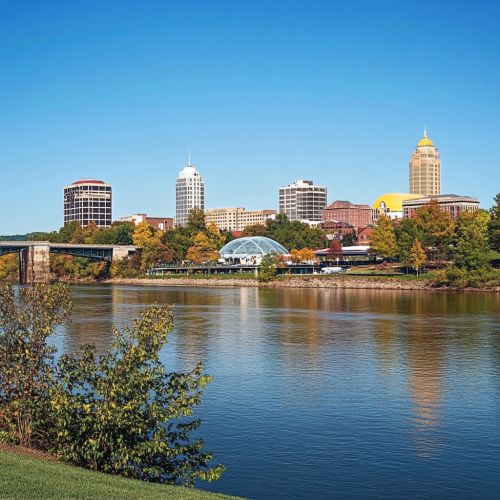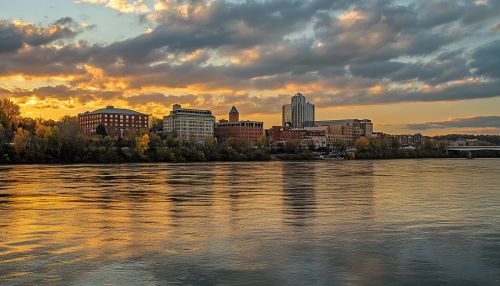Knoxville, Tennessee: Difference between revisions
(Created page with "== History == Knoxville, Tennessee, established in 1791, is one of the oldest cities in the state. Named after Henry Knox, the first Secretary of War, the city played a significant role in the early history of the United States. Knoxville was the first capital of Tennessee, serving from 1796 until 1812. The city's strategic location along the Tennessee River made it a vital hub for commerce and transportation during the 19th century. During the American Civil War, Knoxv...") |
No edit summary |
||
| Line 49: | Line 49: | ||
Knoxville has been home to several notable individuals across various fields. Admiral David Farragut, a prominent naval officer during the American Civil War, was born in the area. Author James Agee, known for his works on American life, also hails from Knoxville. In the entertainment industry, actors such as Patricia Neal and Johnny Knoxville have roots in the city. | Knoxville has been home to several notable individuals across various fields. Admiral David Farragut, a prominent naval officer during the American Civil War, was born in the area. Author James Agee, known for his works on American life, also hails from Knoxville. In the entertainment industry, actors such as Patricia Neal and Johnny Knoxville have roots in the city. | ||
[[Image:Detail-98167.jpg|thumb|center|Skyline of Knoxville, Tennessee, with prominent buildings and the Tennessee River in the foreground.|class=only_on_mobile]] | |||
[[Image:Detail-98168.jpg|thumb|center|Skyline of Knoxville, Tennessee, with prominent buildings and the Tennessee River in the foreground.|class=only_on_desktop]] | |||
== See Also == | == See Also == | ||
Latest revision as of 17:45, 8 October 2024
History
Knoxville, Tennessee, established in 1791, is one of the oldest cities in the state. Named after Henry Knox, the first Secretary of War, the city played a significant role in the early history of the United States. Knoxville was the first capital of Tennessee, serving from 1796 until 1812. The city's strategic location along the Tennessee River made it a vital hub for commerce and transportation during the 19th century.
During the American Civil War, Knoxville was a divided city with both Confederate and Union sympathizers. The Battle of Fort Sanders in 1863 was a notable event, where Union forces successfully defended the city from Confederate attack. Post-war, Knoxville experienced rapid industrial growth, particularly in the textile and manufacturing sectors.
Geography
Knoxville is situated in the Great Appalachian Valley, also known as the Tennessee Valley. The city is surrounded by the Great Smoky Mountains to the southeast and the Cumberland Plateau to the northwest. The Tennessee River flows through the city, providing a natural resource for transportation and recreation.
The city's topography is characterized by rolling hills and valleys, with an elevation ranging from 800 to 1,000 feet above sea level. Knoxville's climate is classified as humid subtropical, with hot summers and mild winters. The region receives an average annual rainfall of 48 inches, contributing to its lush, green landscape.
Demographics
As of the 2020 census, Knoxville has a population of approximately 190,000 residents. The city is part of the larger Knoxville Metropolitan Area, which has a population of over 850,000. The demographic composition of Knoxville is diverse, with a mix of ethnicities and cultures.
The racial makeup of the city is predominantly White (76%), followed by African American (17%), Hispanic or Latino (4%), and Asian (2%). The median age in Knoxville is 33 years, reflecting a relatively young population. The city has a higher education attainment rate, with over 30% of residents holding a bachelor's degree or higher.
Economy
Knoxville's economy is diverse, with key sectors including education, healthcare, manufacturing, and technology. The University of Tennessee, Knoxville (UTK) is a major economic driver, providing employment and fostering innovation through research and development. The university's presence has also led to the growth of a vibrant startup ecosystem.
The Oak Ridge National Laboratory, located nearby, is another significant contributor to the local economy. It is the largest multi-disciplinary laboratory in the Department of Energy system, focusing on scientific research and technological advancements. The healthcare sector is robust, with several major hospitals and medical centers serving the region.
Manufacturing remains a vital part of Knoxville's economy, with companies producing a range of products from automotive parts to consumer goods. The city's strategic location along major highways and railroads facilitates efficient transportation and logistics.
Education
Knoxville is home to several institutions of higher learning, the most prominent being the University of Tennessee, Knoxville. UTK is a public research university with a strong emphasis on engineering, business, and the sciences. The university's Neyland Stadium is one of the largest college football stadiums in the country, reflecting the importance of sports in the community.
Other notable institutions include Pellissippi State Community College and South College. The Knox County Schools system serves the city's K-12 educational needs, with numerous elementary, middle, and high schools. The district is known for its commitment to academic excellence and extracurricular activities.
Culture and Arts
Knoxville boasts a rich cultural scene, with numerous museums, theaters, and music venues. The Knoxville Museum of Art showcases contemporary art and regional artists, while the East Tennessee History Center offers insights into the area's past. The Tennessee Theatre, a historic movie palace, hosts a variety of performances, from Broadway shows to concerts.
The city is also known for its music heritage, particularly in bluegrass and country genres. The annual Big Ears Festival attracts international artists and audiences, celebrating diverse musical styles. Knoxville's vibrant downtown area features numerous galleries, restaurants, and shops, contributing to its lively cultural atmosphere.
Sports and Recreation
Sports play a significant role in Knoxville's community life. The University of Tennessee's athletic programs, particularly football and basketball, draw large crowds and foster a strong sense of school spirit. Neyland Stadium and Thompson-Boling Arena are iconic venues for these events.
Outdoor recreation is abundant, with the Great Smoky Mountains National Park located just a short drive from the city. The park offers hiking, camping, and wildlife viewing opportunities. The Tennessee River and numerous lakes provide options for boating, fishing, and water sports. Knoxville's Urban Wilderness, a network of parks and trails, offers outdoor activities within the city limits.
Infrastructure
Knoxville's infrastructure supports its economic and social activities. The McGhee Tyson Airport, located 12 miles south of downtown, provides air travel services with connections to major cities. The city's road network includes Interstates 40 and 75, facilitating regional and national transportation.
Public transportation is managed by Knoxville Area Transit (KAT), offering bus services throughout the city. The Knoxville Utilities Board (KUB) provides essential services such as electricity, water, and natural gas. The city's healthcare infrastructure includes several major hospitals, such as the University of Tennessee Medical Center and East Tennessee Children's Hospital.
Government
Knoxville operates under a mayor-council form of government. The mayor is the chief executive officer, responsible for the administration of city services and implementation of policies. The City Council, consisting of nine members, serves as the legislative body, enacting ordinances and approving budgets.
The city is part of Knox County, which provides additional services such as education, law enforcement, and public health. Knoxville is represented in the Tennessee General Assembly and the United States Congress, participating in state and federal governance.
Notable People
Knoxville has been home to several notable individuals across various fields. Admiral David Farragut, a prominent naval officer during the American Civil War, was born in the area. Author James Agee, known for his works on American life, also hails from Knoxville. In the entertainment industry, actors such as Patricia Neal and Johnny Knoxville have roots in the city.


See Also
- University of Tennessee, Knoxville
- Great Smoky Mountains National Park
- Oak Ridge National Laboratory
- Tennessee River
- American Civil War
